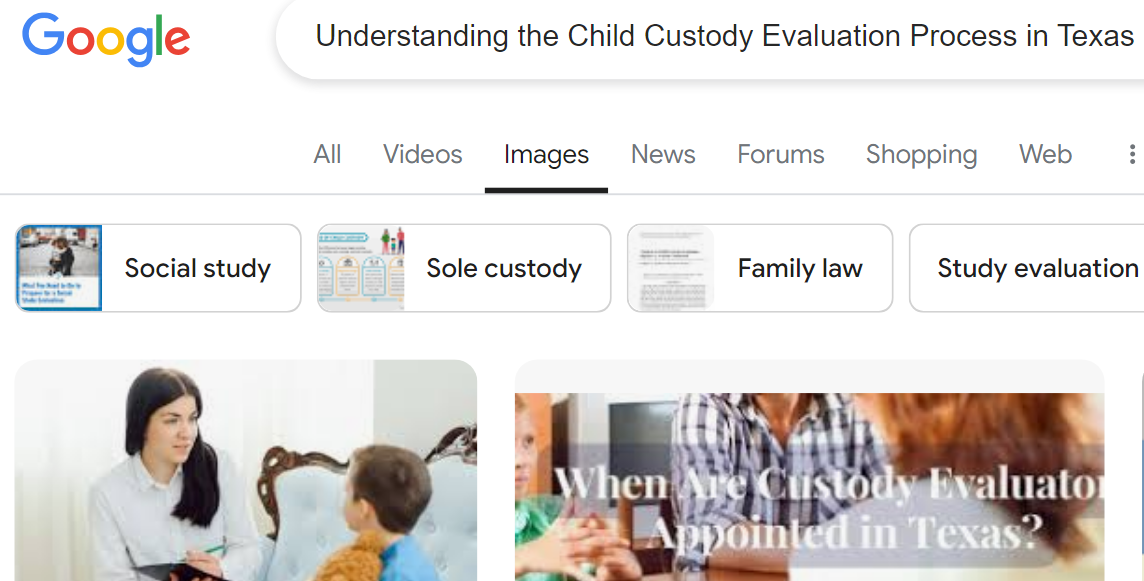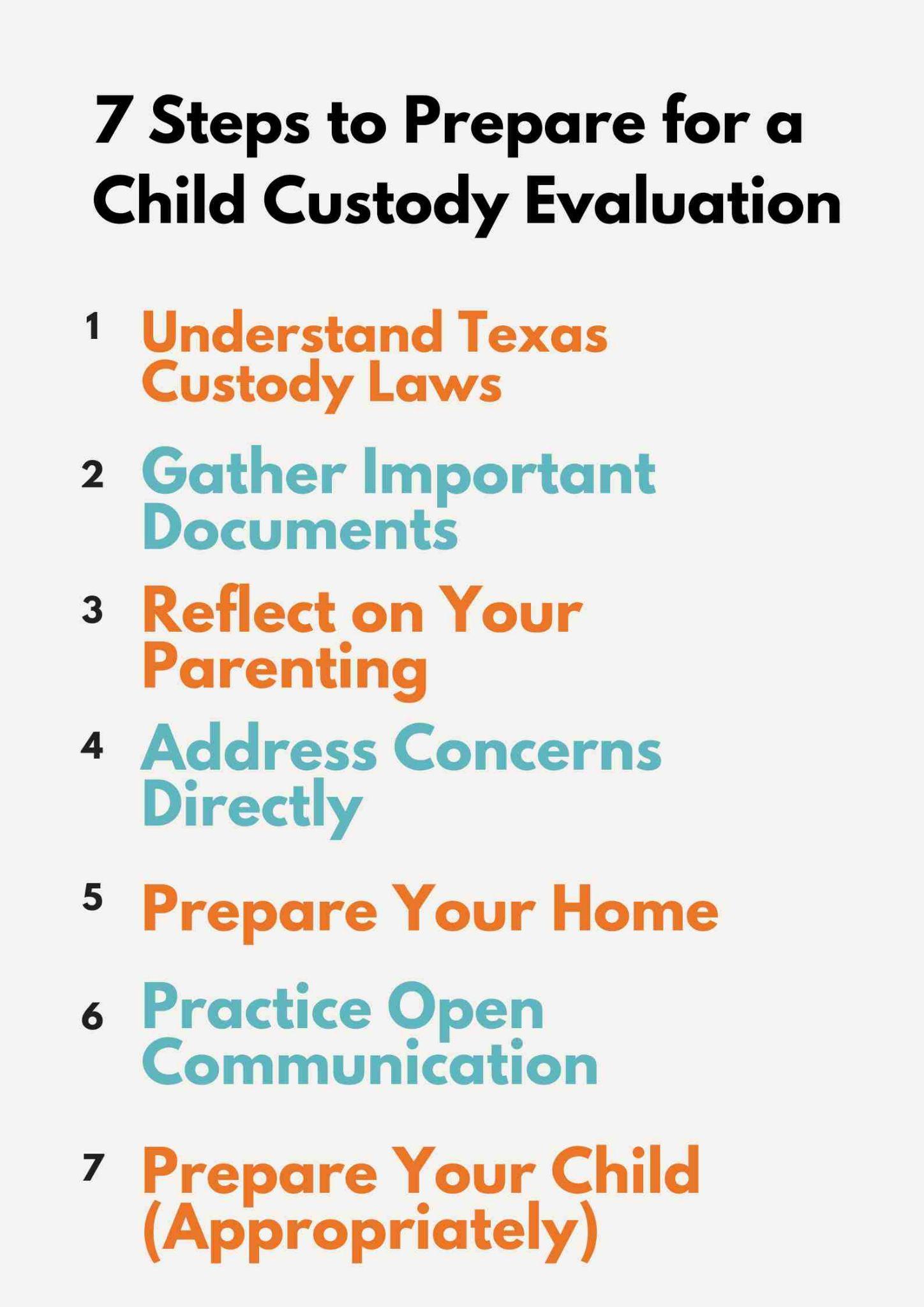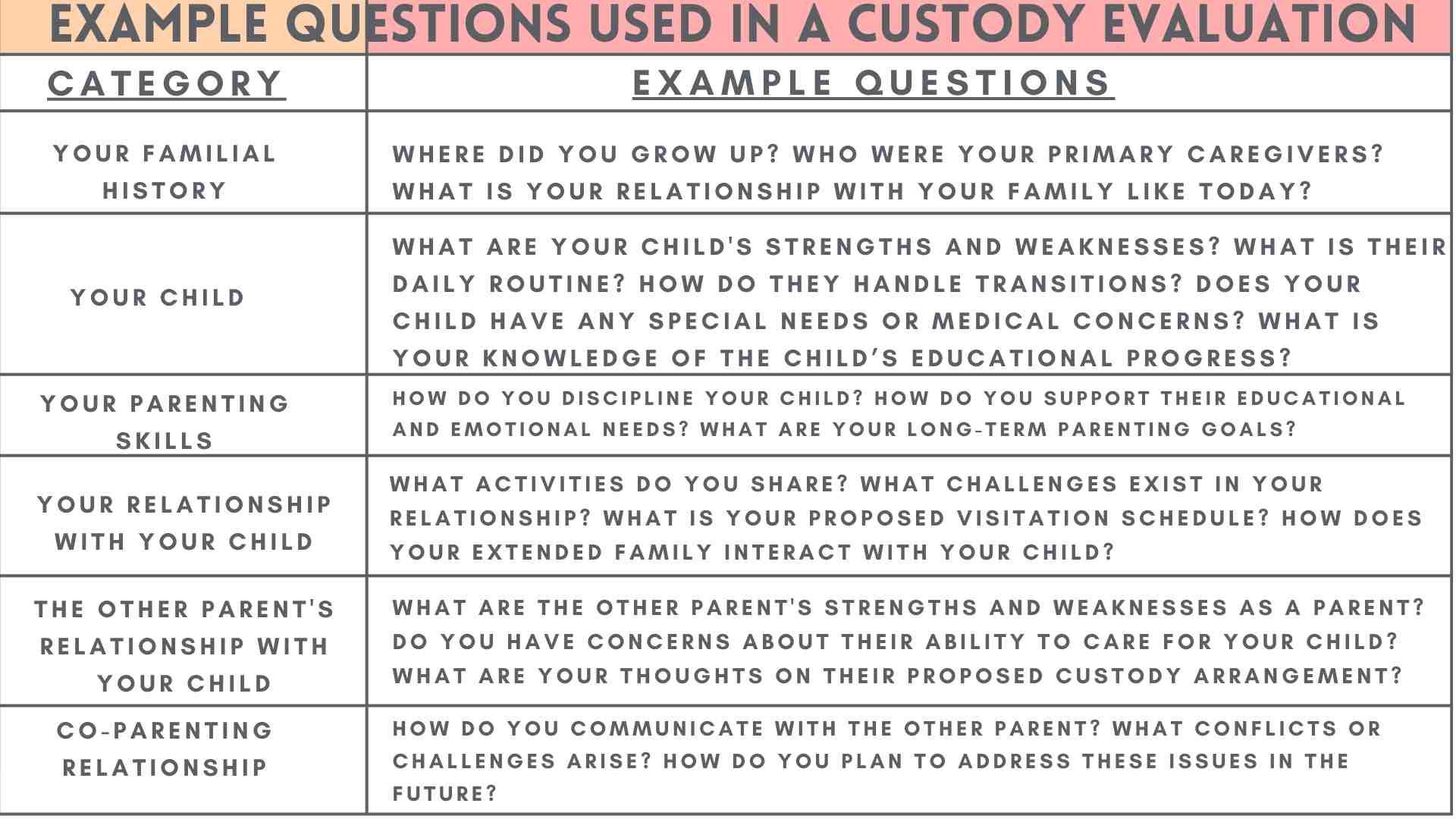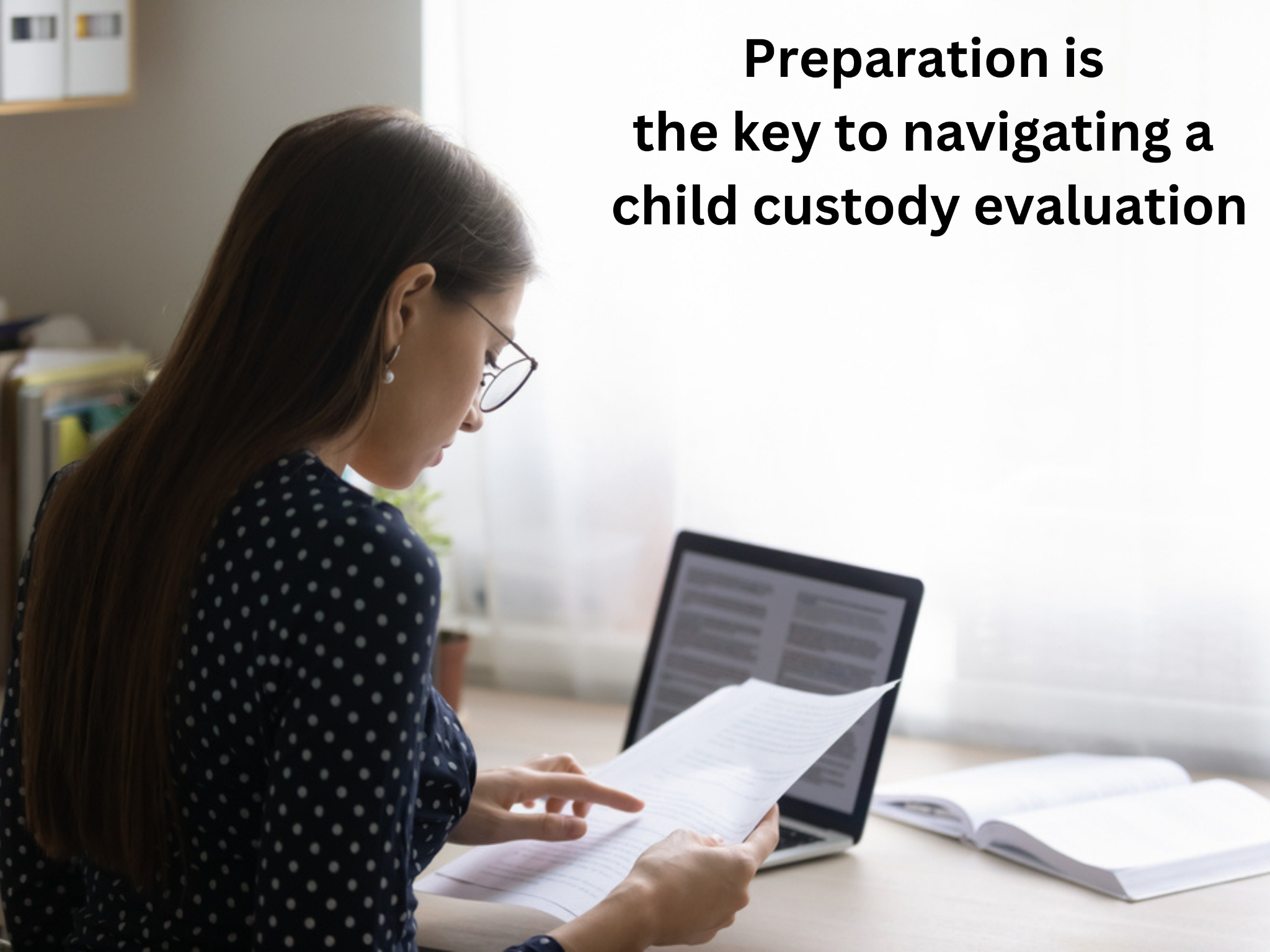As a family law attorney here in Texas, I’ve seen my share of hotly contested child custody battles. Sometimes, it’s because both parents are genuinely good options to have sole custody of the kids, but due to understandable reasons, neither is willing to compromise. That was the case with Jade, a wonderful mother I was representing in her divorce. Jade and her husband agreed on almost everything about their split, except they both wanted the kids, and that made an otherwise clean divorce, into a mess.

Understanding the Child Custody Evaluation Process

When parents can’t agree on custody arrangements and the court needs a neutral party assessment, Texas judges may order a child custody evaluation. This evaluation process involves a mental health professional evaluating each parent and the child.
The goal is to determine the best custody arrangement for the child’s well-being. The professional evaluator gathers extensive information, through parent interviews, observations, home visits, and sometimes psychological tests.
They consider factors like a stable and nurturing home environment, the child’s relationship with each parent, and address concerns raised, especially about substance abuse, parental alienation, or mental health issues. Custody evaluations in Texas can take weeks or months, with the cost typically split between parents.
The Evaluator’s Role and Qualifications
Texas law (Section 107.104) outlines the evaluator’s qualifications, requiring a master’s degree in a relevant field, licensing, two years of experience, and ten supervised evaluations. Meeting these requirements ensures their professional opinions concerning parenting abilities and skills can be trusted in court proceedings.
Evaluators objectively assess the family dynamics, offer insights, and may make recommendations. The family law judge considers the evaluator’s report, giving it great weight, especially when there are allegations of physical, emotional, or sexual abuse, impacting parenting time and the ultimate custody decision.
Steps on How to Prepare for a Child Custody Evaluation

Preparing for a custody evaluation may seem overwhelming. But detailed preparation helps showcase the strengths of your parent-child relationship and reduces the stress involved.
1. Understand Texas Custody Laws
Familiarize yourself with Texas child custody laws. A family law attorney can provide guidance specific to your custody case. Understanding the legal framework affecting custody decisions is essential, especially when domestic violence is involved which can limit a parent’s role.
2. Gather Important Documents
Organize pertinent documents showcasing your involvement in your child’s life, including school records, medical records, and existing custody orders. This documentation will offer insights into the child’s educational needs, medical concerns, and current custody arrangements. This information supports your case and the parent’s ability to meet the child’s needs.
3. Reflect on Your Parenting
Honestly assess your parenting style. Identify your strengths and areas that call for growth. Be ready to discuss specific examples of your parenting skills, highlighting how they benefit your child’s development and well-being.
4. Address Concerns Directly
If past issues like substance abuse are part of the picture, take proactive steps to show they have been resolved. Demonstrate your progress to the custody evaluator. Show commitment to positive change, improving your parenting skills, and creating a healthier home environment. Address any abuse issues or criminal history concerns that might negatively impact the court’s perception of your parenting abilities.
5. Prepare Your Home
Ensure your living space is safe, clean, and child-friendly. A well-maintained home reflects positively on your ability to provide a stable and nurturing environment for your child. The evaluator will assess if you are able to provide proper hydration and nutrition to your child, as well as the suitability of the home during their visit.
6. Practice Open Communication
Communicate openly and honestly during the evaluation. Focus on your child’s best interests and maintain a respectful co-parenting relationship. If conflict arises due to the other parent’s actions, such as spousal spying, address your concerns with the evaluator. This includes discussing potential privacy rights violations and how they affect your child.
7. Prepare Your Child (Appropriately)
Explain the evaluation process to your child in age-appropriate terms. Avoid coaching or influencing their responses. Let them know it’s a way to help the family plan for the future. If there is high-conflict or parental alienation involved, consult a family law attorney for guidance on how to best approach this discussion with your child, keeping in mind the child’s emotional and psychological well-being.

Example Questions Used in a Custody Evaluation
Each child custody evaluation is uniquely tailored to the family’s specific situation by the child custody evaluator. However, some questions commonly come up that focus on each individual parent, each child, the parent-child relationship, and the co-parenting relationship. These questions may seek to gather information about school, healthcare, and family dynamics. It is important to be prepared to answer these commonly asked questions.

Frequently Asked Questions
What is the biggest mistake in a custody battle?
A significant mistake is overly criticizing the other parent. It can appear uncooperative and detract from focusing on yourself as a capable parent. Present your strengths and focus on what’s best for your child. Stay focused on your goals, and present a positive image to the court.
What do most child custody evaluations include?
Evaluations typically involve parent interviews, child interviews, home visits, and sometimes psychological assessments. The social worker or mental health professional appointed by the court uses these methods to assess the “best-interest-of-the-child” factors, such as home stability, parent-child bonds, each parent’s ability to provide for the child’s needs, and mental health.They also consider each parent’s relationship with the child, their willingness to cooperate, and their overall parenting skills. This can involve reviewing school records, health records, and any concerns raised about the child’s well-being.
What is the best interest of the child checklist in Texas?
While checklists can vary depending on the state and even the specific court, Texas prioritizes the child’s health, safety, and welfare. Courts examine each parent’s capacity to provide for the child’s physical and emotional needs, the parent-child relationship quality, and their willingness to facilitate a healthy relationship between the child and the other parent. Knowing how to prepare for a child custody evaluation is crucial to your family courts case.
Who wins the most custody battles?
There’s no typical “winner” profile. Texas courts do not prefer mothers or fathers. Instead, they emphasize the “best-interest-of-the-child” standard. Judges weigh many factors including parental history, home environment, financial stability, and the child’s relationship with each parent. They also look for insight from each parent in addressing questions honestly and clearly articulating their perspectives. This can often involve a psychological evaluation by a qualified mental health professional or social worker.
Conclusion
Preparing for a child custody evaluation is vital for Texas families navigating contested custody arrangements. Understanding Texas custody laws, preparing your home, organizing important documentation like school and health records, addressing concerns, practicing open communication, and preparing your child are essential steps. These efforts demonstrate your commitment to your child’s well-being and stability during this process. Learning how to prepare for a child custody evaluation empowers parents to navigate this challenging time effectively.

How Will Jade Prepare?
“Chris, if it wasn’t for your FAQs section, I think I would have made a big mistake,” Jade said after learning how to prepare for her child custody evaluation. “I’m so angry at Dave about this custody mess that I’d probably just criticize him non-stop. But that’s not the right move, is it?”
“No, it’s not, Jade,” I replied. “Your anger is understandable, but don’t let it lead you to criticize him during the evaluation.”
“Okay, I won’t. I don’t want to come off as unreasonable. I’ll admit, his reasons for wanting to keep the kids in Dallas are valid, even if I hate to admit it. But they’re not more important than the kids being with their mother,” she said.
“I agree. It may help to let the evaluator know you respect his perspective, then explain why the kids will be better off with you in Houston. Suggest reasonable plans for them to visit Dave in Dallas. Build your case honestly and leave room for compromise. Just focus on all you’ve done for the kids and will continue to do.”
“Should I mention I’m going back to law school in Houston, and that the kids will spend time with their grandparents?” she asked.
“Yes, that can show your move is for long-term stability. Law school builds your financial future, and having their grandparents nearby adds stability. Your case is strong—gather all your documentation, prepare answers, and be yourself. I’m sure your home is already child-friendly and safe,” I said. “Just be yourself, and your strengths as a parent will shine through.”
“Thanks, Chris. I already feel better about the situation,” she said, looking more relaxed.
I knew we were set to get an evaluation that would support Jade’s case and help her start fresh in Houston with her kids.

Schedule a Consultation With Our Firm to Learn How to Prepare for a Child Custody Evaluation in Texas
Preparing for a child custody evaluation in Texas can be stressful and challenging, but you do not have to face it alone. Our team of experienced Dallas family attorneys is ready to provide you with the guidance, support, and legal advocacy you need during these challenging times.
Whether you are preparing for a child custody evaluation or navigating other child custody related issues, we are here to help you every step of the way. We welcome you to schedule a consultation to discuss your situation and case objectives. We can answer your legal questions and discuss how we can help you move forward. Call our law office at (888) 584-9614 or contact us online to schedule your consultation.

